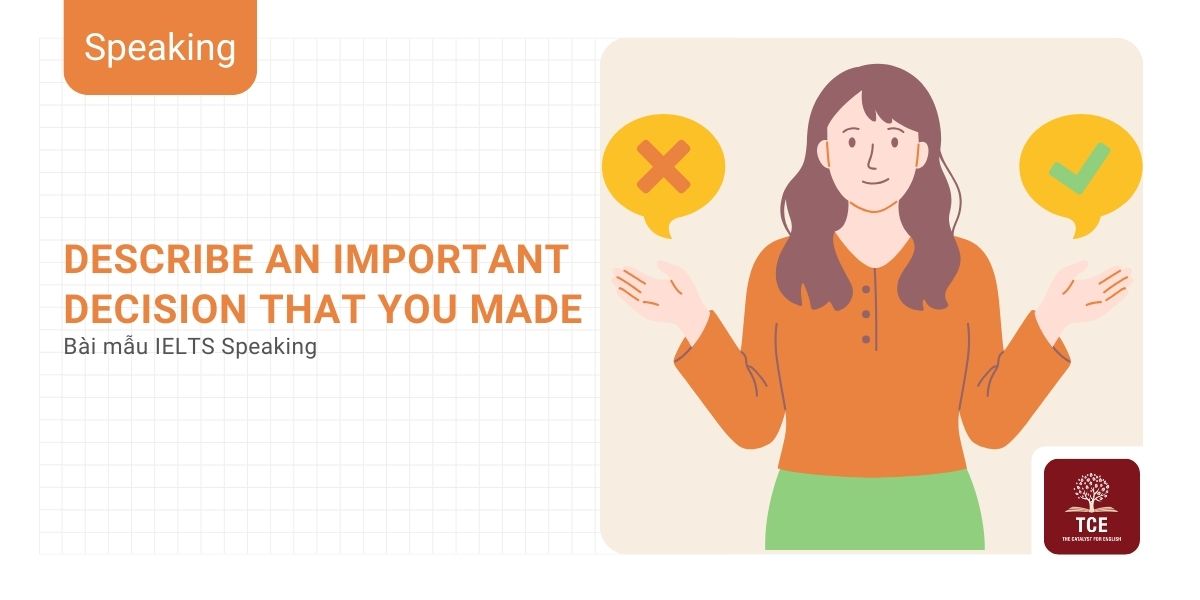“Describe an important decision that you made” là một chủ đề đã nhiều lần xuất hiện trong các đề forecast và trong phòng thi . Để giúp các bạn chinh phục đề bài này, thecatalyst.edu.vn sẽ đem đến cho các bạn các bài mẫu tham khảo Part 2 và Part 3 để các bạn có thể trau dồi và làm giàu thêm vốn từ vựng cũng như các cấu trúc câu hay khi triển khai bài nói nhé.
I. Bài mẫu Describe an important decision that you made part 2
Mời các bạn tham khảo dàn bài và bài mẫu IELTS Speaking Part 2 sau của đề bài “Describe an important decision that you made” cùng các từ vựng hay giúp bạn ăn điểm trong phòng thi.
1. Dàn bài
Đề bài: Describe an important decision you made.
You should say:
- how you made the decision
- and explain why it was difficult to make.
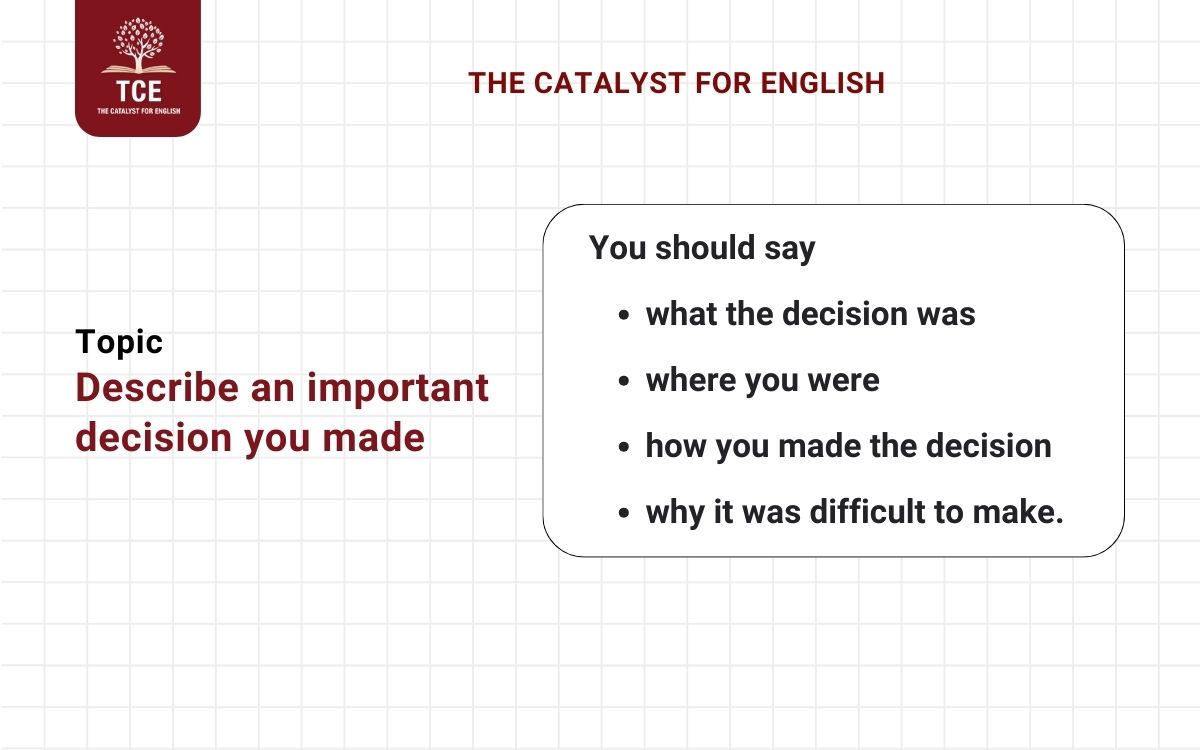
Đề bài: Describe an important decision you made.
Chắc hẳn các bạn đã nghe tới thuật ngữ “cấu trúc 3 hồi” trong kịch bản phim. Cấu trúc đó bao gồm:
- Set up (Sắp đặt): các nhân vật được giới thiệu để tạo ra ngữ cảnh cho câu chuyện và các xung đột dần được đưa ra.
- Confrontation (đối đầu): nhân vật đối đầu với thử thách để đạt được mục đích của mình.
- Resolution (Giải quyết): các nút thắt được giải quyết và khép lại câu chuyện.
TCE cũng tin rằng, để tạo ra một bài nói Part 2 tốt và mạch lạc, chúng ta có thể hoàn toàn dựa trên cấu trúc 3 hồi bên trên để làm dàn ý cho bài nói của mình. Mời các bạn tham khảo dàn ý sau sử dụng cấu trúc 3 hồi để trả lời cho đề bài “Describe an important decision that you made”.
Dàn bài:
1. Set Up (Introduction)
- Decision: Choosing a university major.
- Parents’ Influence: Traditional Asian parents encouraged STEM for financial security
- My own Aspiration: a free spirit (np), preferring English over STEM
2. Confrontation (Conflict)
- Conflict: Heated debate with parents about my major choice.
3. Resolution (Conclusion)
- Outcome: Convincing parents to support my choice.
- Current Status: No regrets; deeply interested in linguistics.
- Lesson: Trust yourself and make decisions based on self-awareness.
|
Nếu bạn đang nỗ lực cải thiện kỹ năng IELTS của mình, đừng ngần ngại tham gia luyện thi IELTS tại TCE. Với đội ngũ giảng viên giàu kinh nghiệm, giáo trình độc quyền và lớp học quy mô nhỏ, bạn sẽ nhận được sự hướng dẫn tận tình cùng cam kết đồng hành để đạt mục tiêu band điểm mong muốn. Ngoài ra, để đánh giá năng lực hiện tại và làm quen với áp lực thi thực tế, bạn có thể đăng ký thi thử IELTS trên máy tính tại TCE. Bài thi được chấm bởi giám khảo chuyên môn cao, giúp bạn hiểu rõ điểm mạnh và điểm cần cải thiện, từ đó lên kế hoạch học tập hiệu quả hơn. Hãy để TCE là người bạn đồng hành trên hành trình chinh phục IELTS của bạn!
2. Bài mẫu
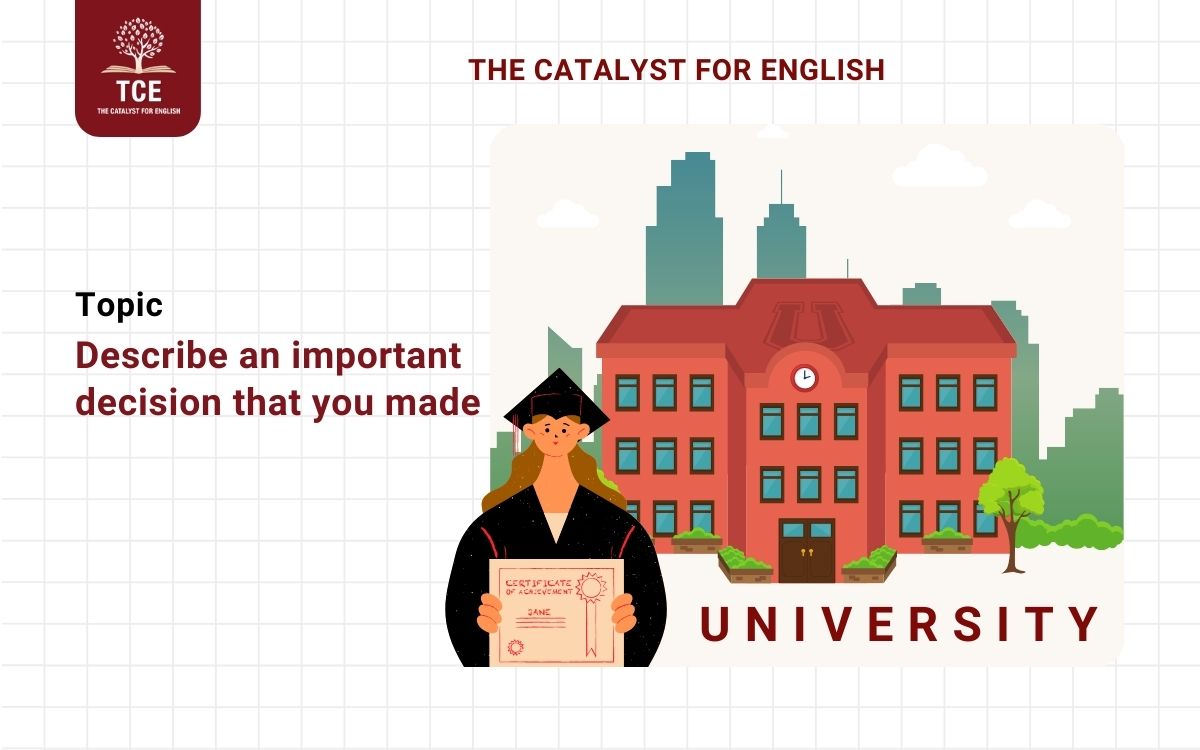
Bài mẫu
When I think about an important decision I made in my life, many come to mind, as each phase of life requires choices. However, the decision that stands out the most was the one I made when I entered university and had to choose my major and I’d like to talk about this particular decision.
It was four years ago when I had to decide on a major for university. My parents, like many traditional Asian parents, strongly encouraged me to pursue a STEM-related field such as computer science, engineering, or medicine. They held a deep-rooted belief that these fields would provide financial security in the future.
However, I have always known myself to be a free spirit, eager to explore different cultures and the world. I never saw myself working with computers or being confined to a room studying theoretical concepts. So I believed English language aligned more closely with my nature and aspirations.
This difference in career choices led to a conflict between my parents and me. Just one week before we had to declare our majors, we had a heated debate. Luckily, I possess some power of persuasion, and after hours of discussion, I eventually convinced my parents to support my decision.
Looking back, I realize how brave and courageous I was to stand up for myself and choose my own path. Now, as a senior majoring in English at the University of Languages, I find myself deeply fascinated by linguistics and have no regrets about my decision.
From this experience, I’ve learned an important lesson: it’s crucial to listen to yourself and understand what you truly want in life. Others may have your best interests at heart, but only you possess the self-awareness to make the right decisions for yourself. Embrace who you are, and be prepared to face the consequences of your choices.
3. Vocabulary (Từ vựng)
| Từ vựng |
Nghĩa |
| phase of life (np) |
giai đoạn của cuộc đời |
| traditional Asian parents (np) |
cha mẹ châu Á truyền thống |
| deep-rooted belief (np) |
niềm tin đã ăn sâu vào tâm trí |
| financial security (np) |
sự an toàn tài chính |
| free spirit (np) |
tâm hồn tự do |
| to be confined to (phr) |
bị giới hạn vào |
| theoretical concepts (np) |
các khái niệm lý thuyết |
| to align with (phr) |
phù hợp với |
| senior (n) |
sinh viên năm cuối |
| have one’s best interests at heart (np) |
luôn mong điều tốt nhất cho ai đó |
| self-awareness (np) |
sự tự nhận thức |
>>> Đọc thêm bài mẫu:
II. IELTS Speaking part 3: Describe an important decision that you made
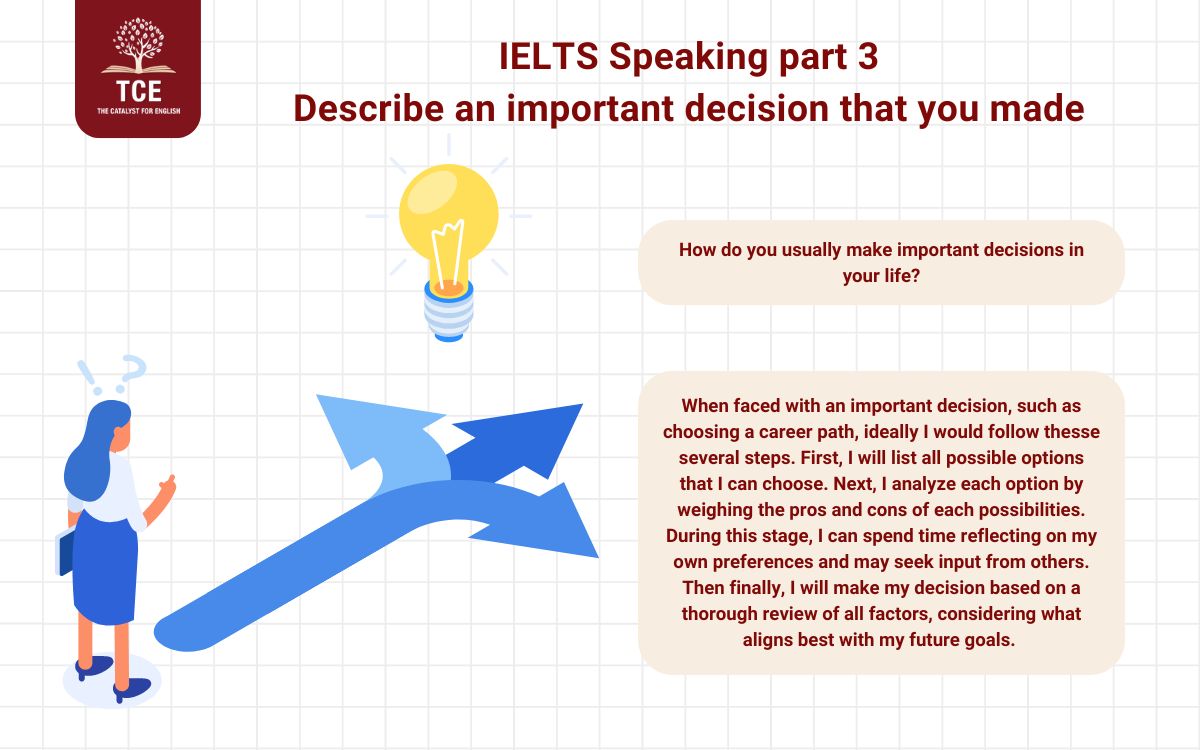
IELTS Speaking part 3: Describe an important decision that you made
Tiếp theo, mời các bạn tham khảo các bài mẫu Part 3 liên quan đến chủ đề “Describe an important decision that you made” do đội ngũ TCE biên soạn:
1. How do you usually make important decisions in your life?
When faced with an important decision, such as choosing a career path, ideally I would follow thesse several steps. First, I will list all possible options that I can choose. Next, I analyze each option by weighing the pros and cons of each possibilities. During this stage, I can spend time reflecting on my own preferences and may seek input from others. Then finally, I will make my decision based on a thorough review of all factors, considering what aligns best with my future goals.
This may seem like a straightforward task, but sometimes it can take a lot of time to reach a reasonable conclusion. The hardest part is that we can never fully explore all possibilities, as we can’t relive our lives to see how different choices might have turned out. We can only make the best decision we can and avoid being paralyzed by indecision.
Từ vựng:
- to weigh the pros and cons (phr) – cân nhắc lợi ích và bất lợi
- input from others (np) – ý kiến từ người khác
- straightforward (adj) – đơn giản, dễ hiểu
- to relive (v) – sống lại (trải nghiệm)
- to turn out (phr) – hóa ra, trở thành
- to be paralyzed (phr) – bị tê liệt, không thể hành động
- indecision (n) – sự do dự, sự thiếu quyết đoán
2. Do you think it’s important to listen to other people’s opinions before making a decision? Why or why not?
I think it’s essential to seek out other people’s opinions before making a decision, but it’s important to consult those who truly understand us. Their insights can provide valuable suggestions that we can weigh alongside our own thoughts. Refusing to listen to others, on the other hand, can be quite limiting. When we close ourselves off to different perspectives, we risk becoming overly rigid or conservative. And I think embracing a range of opinions helps us make more informed decisions.
Từ vựng:
- to consult (v) – tham khảo
- insight (n) – cái nhìn sâu sắc
- to weigh alongside our own thoughts (phr) – cân nhắc bên cạnh suy nghĩ của chính mình
- limiting (adj) – hạn chế
- close oneself off (phr) – khép mình
- to embrace (v) – đón nhận
- informed decision (np) – quyết định sáng suốt
3. Do you think it’s better to make decisions based on logic or emotions? Why?
It’s important to strike a balance between logic and emotion when making decisions because both elements are essential to our nature. Humans aren’t purely logical or purely emotional beings andwe are blessed with both reason and the ability to feel. If we lean too heavily on logic, we may achieve practical benefits but find ourselves unfulfilled or even miserable. For instance, choosing a partner solely for financial stability may lead to regret if there’s no love. On the other hand, basing a decision entirely on emotion can also lead to disaster as emotions by their nature, tend to be irrational and unpredictable, and therefore, they might lead us to act impulsively. Therefore, I think finding harmony between logic and emotion is very important.
Từ vựng:
- to strike a balance (phr) – tìm sự cân bằng
- element (n) – yếu tố
- purely (adv) – hoàn toàn
- to be blessed with (phr) – được ban tặng
- to lean on (phr) – dựa vào
- unfulfilled (adj) – không được thỏa mãn
- miserable (adj) – đau khổ
- irrational (adj) – phi lý
- impulsively (adj) – bốc đồng
- harmony (n) – sự hòa hợp
4. Do you think children sometimes have to make important decisions?
I believe that children under the age of 12 usually have fewer decisions to make because they rely heavily on their parents for guidance. At this age, children often lack the information and self-awareness needed to make their own choices. However, for those aged 15 to 18, the urgency to make decisions becomes more pronounced as they enter a phase of life where independence is partially required. During this time, they must make numerous important decisions about their life paths, career, and personal relationship and such like. With so many options available, this period can feel overwhelming.
Từ vựng:
- guidance (n): sự hướng dẫn
- urgency (n): sự cấp bách
- pronounced (adj): rõ rệt, rõ ràng
- partially (adv): một phần
- philosophical stance (np): quan điểm triết học
- And such like (phr): tương tự
- overwhelming (adj): choáng ngợp
5. What important decisions do teenagers need to make after graduation?
I think after graduation, teenagers can face several critical decisions that can shape their future. They need to decide whether to pursue higher education or enter the workforce, and if they choose further education, they must select a major that aligns with their career prospects and interests. This decision can be overwhelming, as it represents a significant shift towards adult responsibilities.
In addition to their academic and career choices, teenagers must consider other aspects of adult life, such as whether to move out and live independently or continue living with their parents.
Từ vựng:
- to pursue higher education (phr): theo đuổi giáo dục đại học
- workforce (n): lực lượng lao động
- further education (n): giáo dục đại học và sau đại học
- adult responsibilities (np): trách nhiệm của người trưởng thành
- to move out (v): chuyển ra ngoài
6. Who can children turn to for help when making a decision?
When kids face tough decisions, I think they can turn to their parents first as parents, with all their life experience, can offer practical advice and share what they think is the best choice. Sometimes, children can also look to their mentors or role models for guidance, whose attitudes may align with their interests and preferences and therefore can give advice that feels more personal and relevant.
Từ vựng:
- Practical advice (np): Lời khuyên thực tế
- To look to (phr): Nhìn đến, tìm đến
Như vậy, TCE đã giới thiệu đến các bài bài mẫu Part 2 và 3 chủ đề “Describe an important decision that you made”. Hi vọng với các ý tưởng và từ vựng mà chúng mình đã trình bày, mong rằng cách thí sinh có thể áp dụng vào bài nói của mình và chuẩn bị tốt nhất cho kì thi. Chúc các bạn đạt được điểm số như mong muốn!




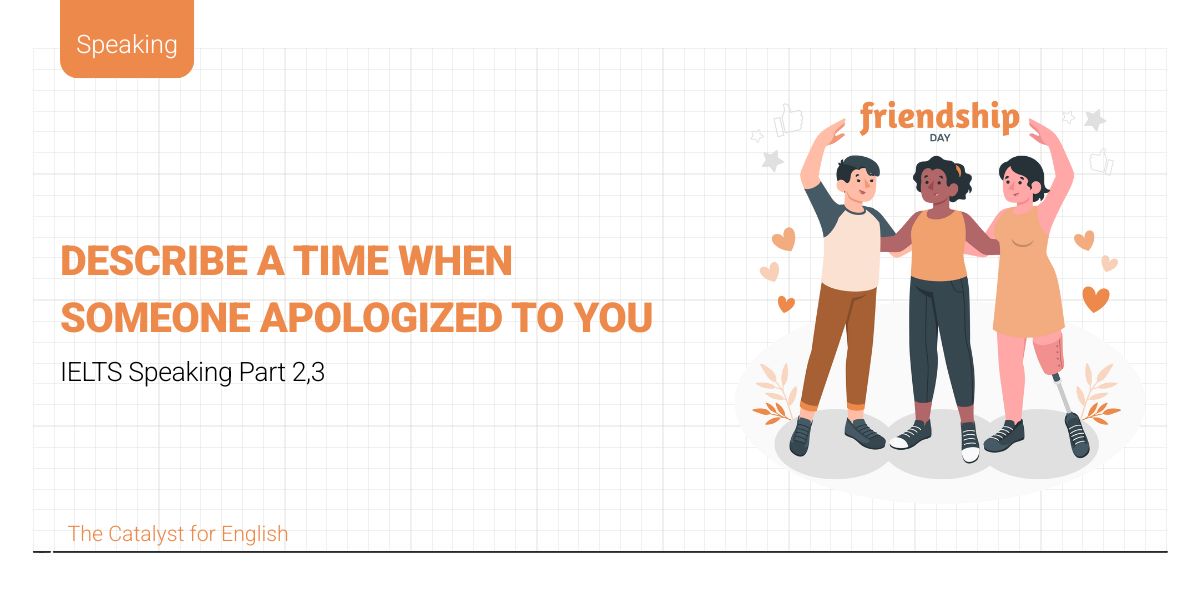
![[PDF + Audio] Tải sách New Insight Into IELTS miễn phí](https://thecatalyst.edu.vn/blogs/wp-content/uploads/2026/02/new-insight-into-ielts.jpg)
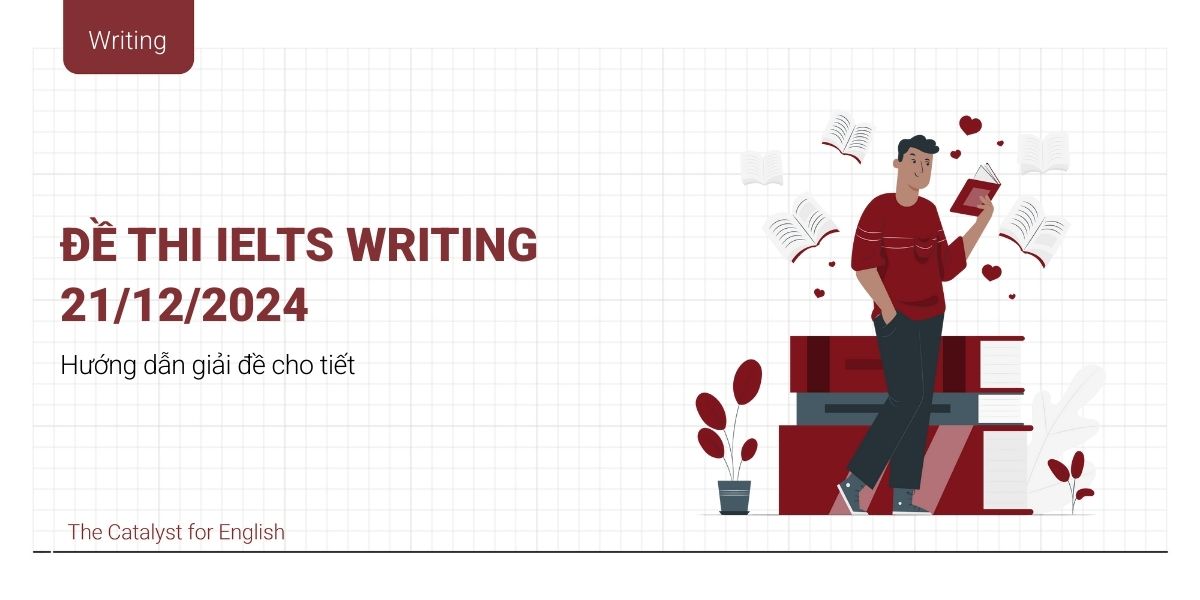
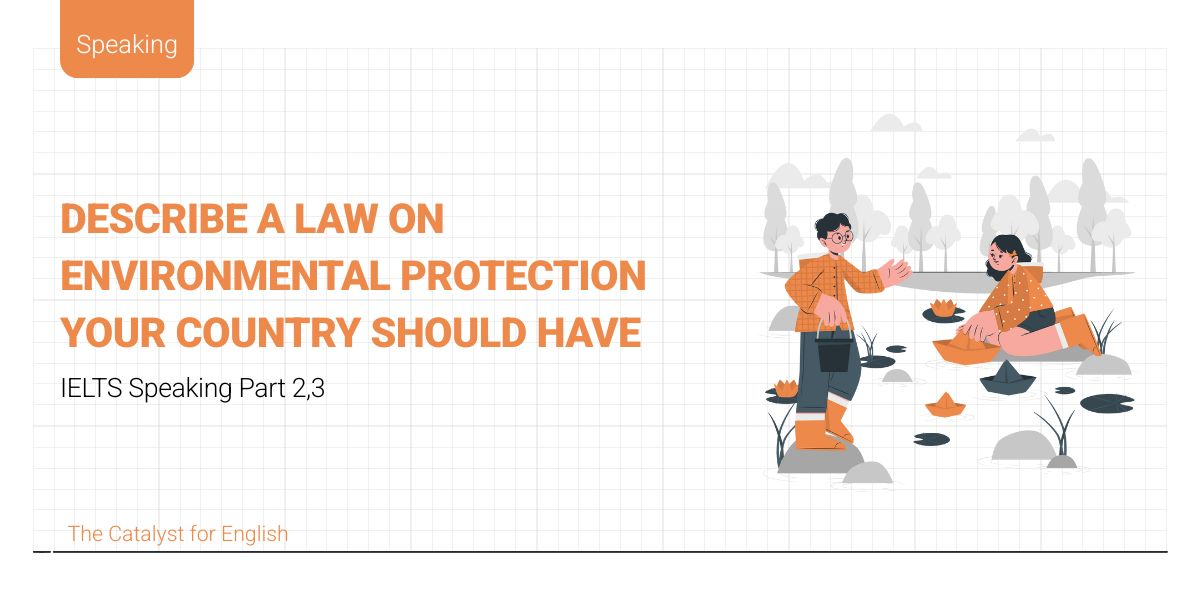
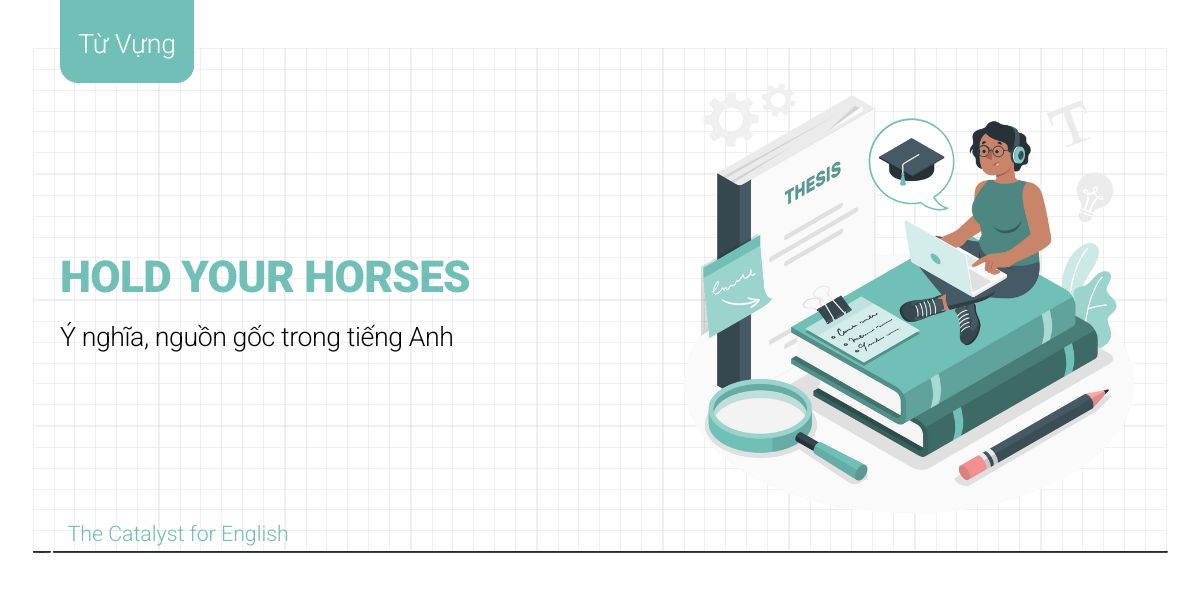
![[ IELTS Speaking Part 2] Describe an electronic device you use often](https://thecatalyst.edu.vn/blogs/wp-content/uploads/2026/02/describe-an-electronic-device-you-use-often.jpg)
